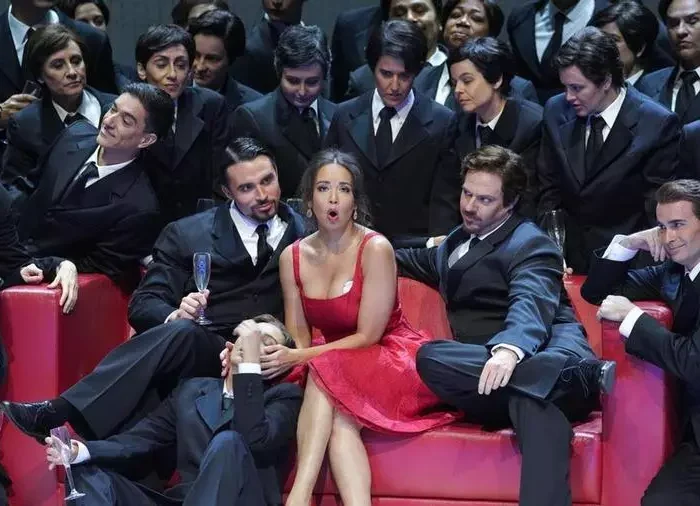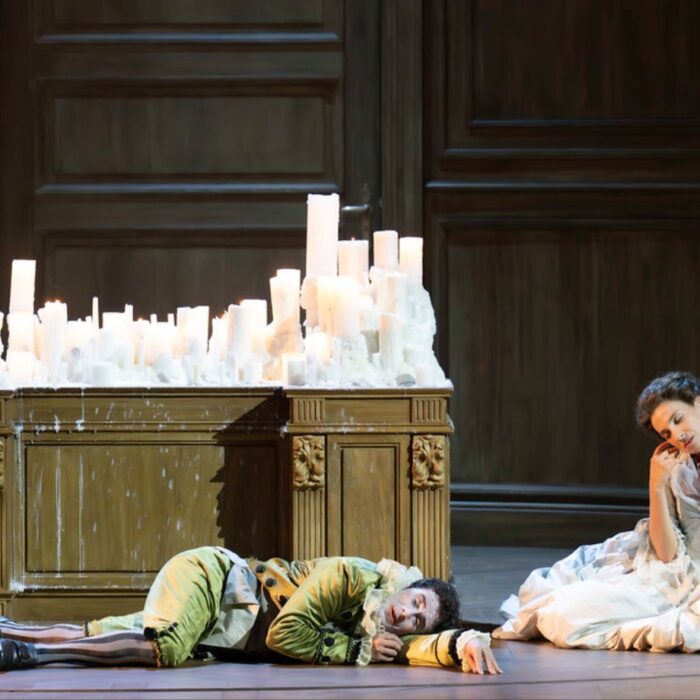
Criticism on Fridays: Opera Australia Celebrates Reopening at Workers’ Expense
OA Gives a Lesson in Overcoming the Crisis While Undermining its Employees
By Polina Lyapustina(Photo by Jesse Hammer)
Every Friday, Polina Lyapustina delivers a short essay on some of the most essential topics in the industry with the intent of establishing a dialogue about the opera world and its future.
On March 25, Opera Australia renewed its activity starting with a run of “La Traviata” at Handa Opera on Sydney Harbour.
Director Constantine Costi reapproached the inaugural production of the venue from 2012, adding new elements to the striking set design, and introducing the choreography by Shannon Burns.
This is how Australian critic Jo Litson starts her review:
“At its best, Handa Opera on Sydney Harbour is one of Sydney’s splashiest, most spectacular performing arts events, given its breathtaking setting on a huge purpose-built stage over the water, with the Sydney Opera House, Sydney Harbour Bridge and cityscape as the backdrop.”
Fa-bu-lous.
Australia launched national COVID restrictions closing the border in February 2020, with general lockdown rules going into effect in March 2020. At that time, Opera Australia had to stop all performances. The company furloughed the majority of its workers under an employee support package and still paid 50 percent of their regular salary. Meanwhile, the organization received the Job Keeper subsidy to help these payments (AUD 1500 per worker a fortnight).
After six months, the Australian Government announced that Job Keeper was drying up. Starting September, the payments for the hight tier employees would be reduced to AUD 1200 and then, to AUD 1000 in January 2021.
At the beginning of September 2020, Opera Australia revealed the current situation and announced the plan. Due to the COVID crisis, the company, whose income (according to the press office’s explanation) was approximately 20 percent governmental funding, 56 percent box office, 7 percent philanthropy, 8 percent sponsorship, and 9 percent other income, experienced a serious shortage of cash.
As the first measure, the administration decided to fire over 25 percent of staff from every department and change the contracts with another 25 percent of workers.
Paul Davies, the director of MEAA’s Musicians section (Media, Entertainment & Arts Alliance is a labor union supporting the workers of Opera Australia), commented on the process in an open letter on September 3, 2020:
“This disgraceful behavior was on show last week when at one presentation given to OA staff, chaired by artistic director Lyndon Teraccini, employees were not permitted to ask questions or comment.
“Questions directed to OA management by the MEAA have not been answered and OA is refusing to consult directly with the union in defiance of the wishes of the majority of staff from all sections of the company.”
And not just that. Changing and cutting up the agreements, Opera Australia decided to get rid of the Unions. And this certainly compromises the job security and sustainability of contracts and their regulation.
Davies continues:
“Management has also signaled it wants to tear up the enterprise agreements which regulate pay and conditions for musicians, choral performers, technicians, stagehands, wigs and wardrobes, props manufacturing and set construction at Opera Australia.”
The workers reacted immediately, and in the statements from the union, they showed an understanding of the financial reality of the recession and willingness to put their energies into saving the institutions they work for.
Unfortunately, it caused no reaction from the company.
As a second step, Opera Australia decided to top up its balance by selling the property and warehouse. The announced plan was to raise up to AUD 70 million. Ultimately, the final deal, in December 2020, brought AUD 46 million (after taxes) to the Opera company.
Opera Australia’s CEO Rory Jeffes said there should be no more layoffs, but despite an increase in cash reserves, the company was not out of crisis yet, and nobody’s talking about the return of dismissed employees.
I find it important to note that Jeffes is leaving the company later this year. It gives him a free hand to make unpopular but economically effective (though not people-oriented) decisions.
The Media, Entertainment & Arts Alliance has called on the company to resist making further unilateral staffing cuts and to renew existing work agreements in light of the sale. But Opera Australia decided to make an effort in a different direction.
In reply to my questions about the plans on extending or reducing the staff and the negotiations with the Union, the company officially refused to comment on any aspects of the workers’ rights, shifting the focus to their new seasons:
“On Friday, we opened our Handa Opera on Sydney Harbour season, which runs through to 25 April. On 6 May, we open our Melbourne Autumn season, and on 22 June, we’ll open our Sydney Winter season. Staffing levels will adjust accordingly as per the demands of each season, but needless to say, barring any further COVID crisis that shuts down our performances, we are going to be very busy over the next 4-5 months.”
This means, that deprived of support and control of operations from the Union, artists will be allowed to work in the productions of Opera Australia across the country and, hopefully, earn good money during the next few months.
But what I’m afraid the most, after a year of stagnation, this situation might become normal — morally accepted by those who work and economically effective for the company. And how will this affect the common situation in the opera industry, when not just a major, but the main opera company of the continent returns to activity, trampling on the rights of their employees and depriving them of guarantees and, frankly speaking, simple respect? Will the audience and critics praise that?
My only hope is that, actually, the Media, Entertainment & Arts Alliance does not give up this fight. So the negotiations continue. But unlike the situation at the Met, which risks not opening without an agreement, Opera Australia has already opened and is now going continue its victorious march across the continent’s stages AND… its workers’ heads.
In the conclusion of my first “Criticism on Fridays”, I wrote:
“I hope that musicians will not calm down once they are back on stage. The end of the pandemic, I assume, will be just the beginning of the fight for rights and safety in the opera world.”
Are we ready?


